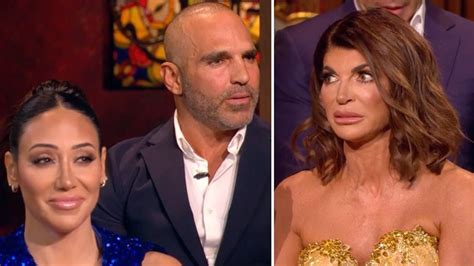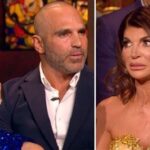
Teresa Giudice abruptly ended an interview with WNYW Fox 5’s “Good Day New York” after anchor Rosanna Scotto questioned her about her family’s finances and spending habits, particularly in light of her husband Luis “Louie” Ruelas’s business ventures and legal issues. The “Real Housewives of New Jersey” star, known for her extravagant lifestyle, terminated the virtual appearance when Scotto inquired about concerns surrounding Ruelas’s financial dealings.
Giudice, who was promoting her new cookbook, “Cook with Love: Comfort Food That Makes You Feel Good,” appeared visibly uncomfortable as Scotto broached the subject. “I know you came here to talk about your cookbook, but everybody, of course, is wondering, is everything ok with Louie? There’s all these lawsuits, there’s things going on. How is that affecting your life and how are you dealing with it?” Scotto asked. Giudice initially responded with a terse, “I’m not going to answer that,” before thanking the hosts and disconnecting from the interview. The incident, which aired live on the morning news program, quickly went viral, sparking debate about the appropriateness of the line of questioning and Giudice’s reaction.
The contentious exchange underscores the ongoing scrutiny surrounding Giudice and Ruelas’s financial affairs, which have been a recurring topic of discussion both on and off the reality television show. While Giudice has consistently defended her husband and maintained a positive public image, the mounting legal and financial challenges continue to fuel speculation and raise questions about the couple’s financial stability. This latest incident highlights the delicate balance between promoting personal projects and addressing public concerns, particularly for celebrities whose lives are heavily scrutinized.
The interview began cordially, with Giudice discussing her cookbook and sharing some of her favorite recipes. However, the atmosphere shifted dramatically when Scotto transitioned to the more sensitive subject of Ruelas’s business dealings. Prior to Scotto’s direct question, Bianca Peters, another anchor, had introduced a segment hinting at the impending topic. Peters stated, “Before we get to your delicious recipes, let’s talk about a few headlines that have been making news, of course.” This setup served as a precursor to Scotto’s inquiry, signaling a departure from the lighthearted cookbook promotion.
Following Giudice’s departure, Scotto and Peters addressed the situation on air. Scotto explained that she felt it was her responsibility to ask about the issues given the public interest and the platform’s role in informing viewers. “I have to ask the questions, that’s my job,” Scotto stated. Peters added that they had hoped for a more open discussion but respected Giudice’s decision not to answer.
Ruelas’s business ventures have been plagued by lawsuits and controversies, including allegations of unpaid debts, questionable business practices, and disputes with former partners. These issues have been extensively covered in the media and have fueled speculation about the couple’s financial situation. On “The Real Housewives of New Jersey,” Ruelas’s business dealings have been a frequent topic of conversation, with other cast members expressing concerns and raising questions about the source of his wealth. Giudice has consistently defended her husband, dismissing the allegations as unfounded and politically motivated.
Giudice’s financial history is also complex. She and her ex-husband, Joe Giudice, were convicted of multiple fraud charges in 2014. Teresa served nearly a year in prison, while Joe was deported to Italy after completing his sentence. The couple’s financial struggles and legal battles were a major storyline on “The Real Housewives of New Jersey” for many years.
The abrupt end to the interview has generated a wide range of reactions on social media. Some viewers criticized Scotto for being insensitive and disrespectful, arguing that she should have focused solely on the cookbook. Others defended Scotto, arguing that she was simply doing her job by addressing legitimate concerns about the couple’s finances. Still others questioned Giudice’s decision to walk out, suggesting that it fueled further speculation and raised more questions than answers.
This incident is not the first time that Giudice has faced scrutiny regarding her finances. Her past legal troubles and her husband’s business dealings have made her a target for media attention and public criticism. The reality star’s tendency to showcase a lavish lifestyle, including expensive vacations, designer clothes, and luxury cars, has further fueled the perception that she is out of touch with reality and insensitive to the struggles of ordinary people.
Giudice’s representatives have not yet issued an official statement regarding the incident. However, sources close to the reality star have suggested that she felt ambushed by the line of questioning and believed that it was inappropriate to discuss her husband’s business affairs during a promotional interview for her cookbook. The incident underscores the challenges faced by celebrities who are constantly in the public eye, particularly those whose lives are intertwined with complex financial and legal issues. Balancing personal privacy with public accountability is a delicate act, and Giudice’s latest interview demonstrates the potential pitfalls of navigating this challenging terrain.
The impact of this incident on Giudice’s public image remains to be seen. While her fans may sympathize with her decision to protect her husband and family, others may view her abrupt departure as an attempt to avoid accountability and hide the truth about her financial situation. Ultimately, the incident serves as a reminder of the ongoing scrutiny that celebrities face and the importance of transparency and honesty in maintaining public trust. The incident also highlights the role of journalists in holding public figures accountable and asking tough questions, even when those questions may be uncomfortable or unwelcome. The balance between respecting personal boundaries and fulfilling the public’s right to know is a constant challenge in the world of media and entertainment. The “Good Day New York” interview with Teresa Giudice has undoubtedly added another chapter to the ongoing saga of her life and career, and it will be interesting to see how she navigates the fallout in the weeks and months to come. The incident also serves as a case study in crisis communication and the importance of having a well-defined strategy for dealing with difficult questions and challenging situations. For celebrities like Giudice, who are constantly in the public eye, managing their image and reputation is an ongoing process that requires careful planning and execution.
The long-term implications of this event are still unfolding, but it’s clear that it has added another layer of complexity to the already intricate narrative surrounding Teresa Giudice and her family. The incident has not only reignited discussions about her husband’s business ventures and legal troubles but has also raised questions about her approach to managing her public image and handling potentially damaging media inquiries. It remains to be seen how Giudice will address the situation in future interviews and public appearances, and whether she will take steps to provide greater clarity about her family’s financial situation. In the meantime, the incident serves as a reminder of the challenges and pressures faced by celebrities who are constantly under the spotlight, and the importance of maintaining a delicate balance between protecting their privacy and fulfilling their obligations to the public. The interview, which was intended to promote Giudice’s cookbook, has instead become a symbol of the ongoing scrutiny and speculation surrounding her personal and financial affairs. The episode is likely to be discussed and analyzed for some time to come, both within the media and among fans of “The Real Housewives of New Jersey.” It has also sparked a broader conversation about the role of journalists in holding public figures accountable and the ethical considerations involved in asking tough questions, particularly in the context of entertainment and celebrity news. The incident highlights the complex and often fraught relationship between celebrities and the media, and the challenges of navigating the competing demands of personal privacy and public interest.
The financial transparency of public figures, particularly reality television stars, is a constantly debated subject in the media landscape. The appeal of reality TV often stems from the perceived authenticity and access it offers into the lives of its subjects. However, this access also comes with an expectation of openness, especially when the subjects are profiting from their public image.
In Teresa Giudice’s case, her financial history, including her previous fraud conviction, and her husband’s business ventures have created an ongoing narrative that makes her finances a legitimate subject of public inquiry. The “Good Day New York” incident underscores the difficulty in separating a celebrity’s personal life from their public persona, especially when financial issues are intertwined.
This incident also highlights the media’s role in holding public figures accountable. While there is a balance between intrusive probing and responsible reporting, journalists often feel obligated to address concerns and questions that are already circulating in the public sphere. Rosanna Scotto’s question, while direct, can be seen as fulfilling this journalistic role, giving Giudice an opportunity to address the allegations.
The way Giudice handled the situation reflects a common strategy among celebrities facing potentially damaging questions: deflection. By abruptly ending the interview, Giudice avoided answering the question directly, but also generated more attention and speculation. This strategy can sometimes backfire, as it can reinforce the perception that the celebrity has something to hide.
The incident also prompts questions about the ethics of celebrity interviews. How far should interviewers go in asking tough questions? What responsibilities do celebrities have to address public concerns? These questions have no easy answers and are often debated in media ethics circles.
The “Good Day New York” interview incident also illuminates the changing dynamics of celebrity-media relations in the age of social media. Social media platforms have given celebrities greater control over their own narratives, allowing them to bypass traditional media outlets and communicate directly with their fans. However, social media can also amplify criticism and scrutiny, making it more difficult for celebrities to control the narrative.
Giudice’s decision to walk out of the interview can be seen as an attempt to regain control of the narrative and avoid being put on the defensive. However, it also opened her up to further criticism and speculation on social media, where viewers and commentators quickly weighed in on the incident.
The incident underscores the importance of strategic communication for celebrities. In today’s media landscape, celebrities need to be prepared to address difficult questions and manage their public image proactively. This often involves working with public relations professionals to develop a communication strategy that anticipates potential challenges and mitigates reputational risks.
The impact of the “Good Day New York” incident on Giudice’s brand remains to be seen. While the incident may alienate some viewers, it could also galvanize her fan base and reinforce her image as a strong, independent woman who is willing to defend her family. Ultimately, the long-term impact will depend on how Giudice addresses the situation in the future and whether she is able to provide greater clarity about her family’s financial situation.
The incident involving Teresa Giudice and Rosanna Scotto is a microcosm of the broader tensions between celebrity culture, media scrutiny, and public expectations. It underscores the challenges faced by public figures in navigating the complex and often unforgiving media landscape. The incident also serves as a reminder of the importance of transparency, accountability, and strategic communication in maintaining public trust and managing reputational risks.
Giudice’s case is unique due to her history with legal and financial issues, which makes her financial situation a subject of public interest. While promoting her cookbook, the discussion around her husband’s financial woes overshadowed her culinary project, highlighting the challenges faced by celebrities with controversial backgrounds.
Furthermore, this incident emphasizes the evolving role of journalists in the digital age. While celebrity interviews are often seen as promotional opportunities, they also provide a platform for addressing public concerns and holding figures accountable. Rosanna Scotto’s decision to ask about Luis Ruelas’s business ventures, despite knowing it was a sensitive topic, reflects the media’s responsibility to inform the public.
The reactions to the interview on social media also demonstrate how quickly narratives can be shaped and disseminated in the digital age. The public’s perception of the incident, whether they view Giudice as a victim or as someone avoiding accountability, is influenced by a variety of factors, including their existing opinions of her, the tone of media coverage, and the comments of other social media users.
In conclusion, the “Good Day New York” interview incident involving Teresa Giudice is a complex event with multiple layers of meaning. It highlights the tensions between celebrity privacy and public interest, the responsibilities of journalists, and the power of social media to shape public opinion. The long-term impact of the incident on Giudice’s career and public image remains to be seen, but it serves as a valuable case study for understanding the dynamics of celebrity culture in the digital age. It also underscores the importance of strategic communication, transparency, and accountability for public figures who wish to maintain public trust and manage their reputations effectively. Ultimately, the incident is a reminder that in today’s media landscape, celebrities are constantly under scrutiny, and their actions are subject to intense public scrutiny. Frequently Asked Questions (FAQs)
1. Why did Teresa Giudice walk out of the “Good Day New York” interview?
Teresa Giudice ended the interview abruptly because she was asked about her husband, Luis “Louie” Ruelas’s, business ventures and the legal issues surrounding them. Giudice stated, “I’m not going to answer that,” before thanking the hosts and disconnecting the call. She was there to promote her new cookbook, “Cook with Love: Comfort Food That Makes You Feel Good,” and felt the questions about her husband’s finances were inappropriate and off-topic.
2. What exactly did Rosanna Scotto ask Teresa Giudice that prompted her to leave?
Rosanna Scotto, the anchor of “Good Day New York,” asked Giudice: “I know you came here to talk about your cookbook, but everybody, of course, is wondering, is everything ok with Louie? There’s all these lawsuits, there’s things going on. How is that affecting your life and how are you dealing with it?” This question regarding Ruelas’s legal and financial troubles led to Giudice ending the interview.
3. What are the legal and financial issues surrounding Luis Ruelas that Rosanna Scotto was referring to?
Luis Ruelas’s business ventures have been subject to several lawsuits and controversies. These include allegations of unpaid debts, questionable business practices, and disputes with former business partners. These issues have been widely reported in the media and discussed on “The Real Housewives of New Jersey,” making them a matter of public interest. The specific details of the lawsuits often involve allegations of breach of contract, fraud, and failure to pay vendors.
4. Has Teresa Giudice faced financial scrutiny in the past?
Yes, Teresa Giudice has a well-documented history of financial troubles. She and her ex-husband, Joe Giudice, were convicted of multiple fraud charges in 2014. Teresa served nearly a year in prison, while Joe was deported to Italy after completing his sentence. Their financial struggles and legal battles were a major storyline on “The Real Housewives of New Jersey” for many years. Her past legal issues contribute to the ongoing interest in her current financial situation.
5. What has been the public reaction to Teresa Giudice’s abrupt departure from the interview?
The public reaction has been mixed. Some viewers criticized Rosanna Scotto for being insensitive and disrespectful, arguing that she should have focused solely on the cookbook promotion. Others defended Scotto, arguing that she was simply doing her job by addressing legitimate concerns about the couple’s finances, especially given the platform’s role in informing viewers. Still others questioned Giudice’s decision to walk out, suggesting that it fueled further speculation and raised more questions than answers. Social media has been flooded with opinions on both sides of the issue.








